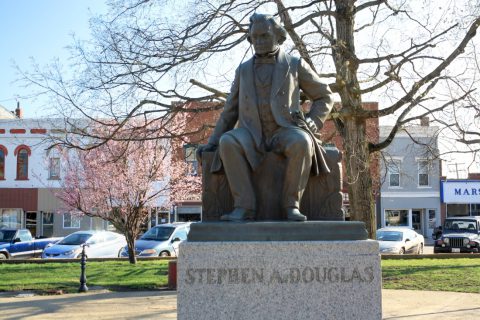
Winchester Founded
Established in 1830, Winchester was platted by A.P. and M.A. Hickinson in what was then Morgan County. Arranged in thirty-six lots on a tributary of the Illinois River called Sandy Creek, the town was established as Illinois was still in its infancy. The State of Illinois had only been in existence for 12 years and Chicago wasn’t incorporated until 1833. Winchester developed into a burgeoning agricultural town, becoming the seat of Scott County when it was formed in 1839.
Visitors and Settlers
Many settlers came to Illinois from the eastern and southern states attracted by the alluvial soil that was so apt for farming. A large number of English immigrants settled in an area known as the “Barrens” just east of town; the land proved to be valuable for farmers accustomed to much poorer conditions. The town welcomed a young Stephen A. Douglas in the winter of 1833. Traveling and looking for work, he found a job as a clerk for an estate sale and was compelled to teach a school of 40 pupils that winter. He would later become an American politician that was the Democratic candidate in the 1860 election losing to Abraham Lincoln.
Abraham Lincoln Speaks in Winchester
In 1854, Abraham Lincoln presented his first speech in opposition of the Kansas-Nebraska Act in Winchester. As local stories tell, he was quoted as wanting to “try it out on the dog,” so to speak. The legislation was created by one time resident, Stephen A. Douglas, to allow territories to vote on whether to allow slavery in newly forming states. This issue is known to have rejuvenated Lincoln’s political career leading to his presidency in 1860. Douglas helped rally union sentiment for Lincoln after the Civil War began
A Growing Town
At the turn of the century, Winchester boasted a wide variety of services and stores. In 1903, the
Times reported that Winchester had 8 doctor offices, 6 grocery stores, 3 meat markets, 2 bakeries, 3 hotels, 2 jewelry stores, 2 lumber yards, 3 grain elevators, 2 farm implement stores, a wagon manufacturer, and a soda factory. Economic and social services continued to develop with the times, and many businesses such as the Illinois Rural Electric Co-op and FS Co-op still operate and grow today.
